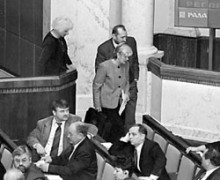Verkhovna Rada devoted the whole day of January 16 to its hearing on the Problem of Informational Activities, Freedom of Speech, Observance of Laws, and the Status of Informational Safety of Ukraine. The hearing revealed the common disease of the Ukrainian body politic: the tendency to break down cardinal, basic, and strategic problems and tasks to tiny pieces, minor problems, and details. Meanwhile, truly systemic statements and proposals are often overwhelmed by the general din of voices and bathos of accusations and statements obligating no one to anything, of which more than enough were made at the hearing. The din simply showed once again what we have already long known: the problems of freedom of speech in this country are primarily caused by the state’s monopoly in the information sector, that is, through non-legal mechanisms, and the dependence of the success in media business on political loyalty. Chairman of the relevant committee Oleksandr Zinchenko’s recognition of the tendency to “introduce political censorship both at the national and also regional and local levels; pressure exerted by state authorities on the mass media designed to make them change their political course; and the destruction of mass media outlets by imposing unreasonably high civil damages for moral injury was essential in defining the critical situation concerning the freedom of expression in this country. The emphasis placed on the need to settle any conflicts in the mass media only judicially and to reform the judicial system was also important.
However, in my view, the most important, systemic statements at the hearing were made by Speaker Ivan Pliushch in his speech. The head of parliament said that the Ukrainian Constitution contained a primordial error, due to which we interpret censorship as interference with the ideological content of this country’s mass media. However, said Mr. Pliushch, today there is also censorship exercised by mass media owners, which often makes journalists dependent. According to the nation’s top lawmaker, at the current stage censorship should be interpreted as any barrier to citizens obtaining unbiased, full information. And it should be prohibited precisely in this sense.
A second fundamental suggestion put forth by Mr. Pliushch related to the need to place complete responsibility (including legal liability) for the content of published information directly to the journalist, rather than the editor, which is the case now. In his view, this would enable journalists to insist on their duty to provide objective information.
Unfortunately, judging by the speeches that followed, those really important suggestions remained unheard and were not discussed.







